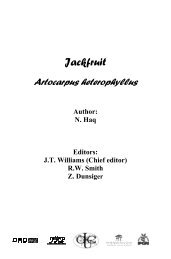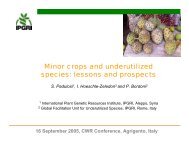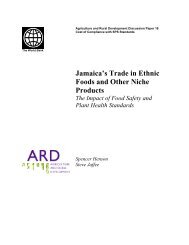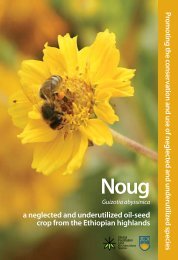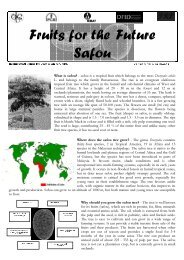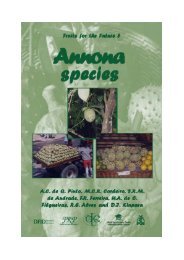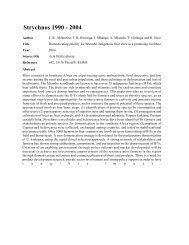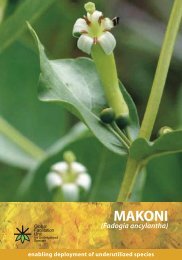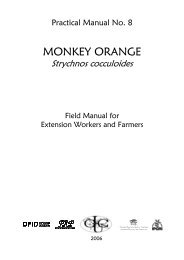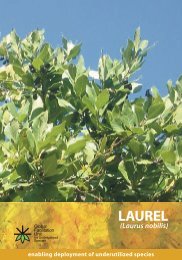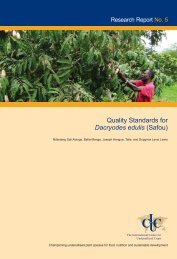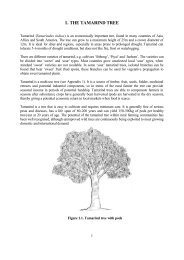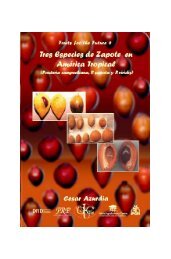- Page 1 and 2: Fruits for the Future 1 Revised edi
- Page 3 and 4: ICUC The International Centre for U
- Page 5 and 6: 3.5.4 Bark, flower and root........
- Page 7 and 8: CHAPTER 10. ECONOMICS OF PRODUCTION
- Page 9 and 10: Figures 1.1 Compound leaves and lea
- Page 11 and 12: Chapter 1. Introduction, Taxonomy,
- Page 13 and 14: Country Language Name(s) Malawi Nig
- Page 15 and 16: 1.4 Description 1.4.1 Vegetative mo
- Page 17: A 1 cm B 7 1 cm D C E F 1 cm 1 cm F
- Page 21 and 22: plantation scale in India and Thail
- Page 23 and 24: Chapter 2. Properties of the Specie
- Page 25 and 26: Table 2.3 Some physico-chemical pro
- Page 27 and 28: Table 2.4 Proximate composition of
- Page 29 and 30: value. It also contains 14-18% albu
- Page 31 and 32: Table 2.8 Fatty acid composition of
- Page 33 and 34: content. The composition of tamarin
- Page 35 and 36: is therefore, not advisable (Maille
- Page 37 and 38: seasoning for cooked rice, meat and
- Page 39 and 40: hydrogen cyanide, trypsin inhibitor
- Page 41 and 42: 3.4.6 Wood Tamarind wood has many u
- Page 43 and 44: presence of saponins in the fruit (
- Page 45 and 46: 3.5.5 Veterinary use Atawodi et al.
- Page 47 and 48: set at 2.0% beyond which the jellie
- Page 49 and 50: 3.6.4 Tamarind pulp powder Tamarind
- Page 51 and 52: covers the product. Tamarind pickle
- Page 53 and 54: The seed testa contains 23% tannin,
- Page 55 and 56: Patents granted (USPTO) Assignee/Ap
- Page 57 and 58: ainfall; this is due in part to its
- Page 59 and 60: and Madagascar (Bayala et al., 2003
- Page 61 and 62: the seeds’ volume and weight, and
- Page 63 and 64: Mechanical scarification has also b
- Page 65 and 66: spent mushroom beds (1:1) and iii)
- Page 67 and 68: months old and of uniform size shou
- Page 69 and 70:
The girdling of etiolated shoots re
- Page 71 and 72:
(84.1%), mean number of multiple sh
- Page 73 and 74:
transporting them. Overgrown seedli
- Page 75 and 76:
of aspects of tree management are d
- Page 77 and 78:
light yellow in colour, have been r
- Page 79 and 80:
5.4.3.4 Irrigation Irrigation is no
- Page 81 and 82:
5% Aldrin, where permitted, at 500
- Page 83 and 84:
The ripening pods of tamarind are a
- Page 85 and 86:
the tree is famous for its fine cul
- Page 87 and 88:
5.5.3 Large and small scale product
- Page 89 and 90:
Plate 1. An inflorescence showing f
- Page 91 and 92:
Plate 6. Cleft grafting Plate 7. Gr
- Page 93 and 94:
Plate 10. Mass flowering of tamarin
- Page 95 and 96:
Plate 14. Variation in flower colou
- Page 97 and 98:
Chapter 6. Reproductive Biology 6.1
- Page 99 and 100:
Table 6.1 Variation of flowering an
- Page 101 and 102:
An experiment was conducted to eval
- Page 103 and 104:
outcrossing. Heterogamous floral ad
- Page 105 and 106:
Chapter 7. Genetic Improvement 7.1
- Page 107 and 108:
Divakara, 2002; Shanthi, 2003). A m
- Page 109 and 110:
7.3.3 Ideotypes It is essential the
- Page 111 and 112:
Chapter 8. Genetic Resources 8.1 In
- Page 113 and 114:
Table 8.1 Characters useful to dist
- Page 115 and 116:
8.3.3 India In India, most of the a
- Page 117 and 118:
degree of sweetness. In the Philipp
- Page 119 and 120:
Chapter 9. Harvest, Postharvest and
- Page 121 and 122:
Tree to tree variation is widely ob
- Page 123 and 124:
Feungchan et al. (1966 f) attempted
- Page 125 and 126:
or in combination. It was found tha
- Page 127 and 128:
The profitability of seedling orcha
- Page 129 and 130:
statistics are unavailable for thes
- Page 131 and 132:
� Most of the exports are from on
- Page 133 and 134:
intervention will not only reduce e
- Page 135 and 136:
Country Quantity (metric Table 10.4
- Page 137 and 138:
Table 10.6 Export of tamarind seeds
- Page 139 and 140:
The major importers of fresh tamari
- Page 141 and 142:
tamarinds. In Thailand and the Phil
- Page 143 and 144:
an eco-geographic approach. Because
- Page 145 and 146:
11.2.7 International trade It is no
- Page 147 and 148:
Arroyo, M.K. (1978) Breeding system
- Page 149 and 150:
Brown, W.H. (1954) Useful Plants of
- Page 151 and 152:
Corner, E.J.H. (1945) Wayside Trees
- Page 153 and 154:
FAO (1999) Progress toward developm
- Page 155 and 156:
(L.) Del., Parkia biglobosa (Jacq.)
- Page 157 and 158:
Jaiwal, P.K. and Gulati, A. (1992)
- Page 159 and 160:
Kumar, K.P.V. and Sethuraman, M.G.
- Page 161 and 162:
Maille, P. (1991) Low-tech leaf mul
- Page 163 and 164:
Muok, B.O., Owuor, B., Dawson, I. a
- Page 165 and 166:
Perrier de la Bâthie, H. (1936) Bi
- Page 167 and 168:
Ramos, A. Visozo, A., Piloto, J., G
- Page 169 and 170:
Sasidharan, K.R., Nagarajan, B., Mo
- Page 171 and 172:
Sone, Y. and Sato, K. (1994) Measur
- Page 173 and 174:
Usha, K. and Singh B. (1996) Influe
- Page 175 and 176:
Appendix I. Institutions and indivi
- Page 177 and 178:
Department of Food Technology Feder
- Page 179 and 180:
COSTA RICA Consejo Nacional de Prod
- Page 181 and 182:
Dr V. Gomathi Dep. Environ. Sci. Ta
- Page 183 and 184:
Small Industry Extension Training I
- Page 185 and 186:
PERU Dr L. Guzman Programa Acad. Ag
- Page 187 and 188:
Dr. R.L. Whistler Whistler Centre f
- Page 189 and 190:
PHILIPPINES Institute of Plant Bree
- Page 191 and 192:
Viyai Seed Stores PO Ranjhawawala (
- Page 193 and 194:
act - a much-reduced leaf, particul
- Page 195 and 196:
pubescent - covered with hairs, esp
- Page 197 and 198:
geographical distribution, 1, 10, 4



